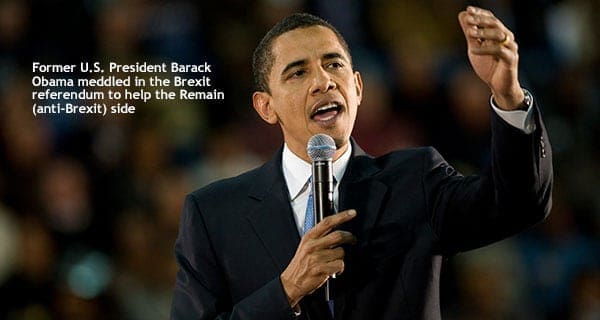 You’d have to be living in a cave to be unaware of the controversy over Russian meddling in the 2016 U.S. presidential election. And much of the related discussion has approached apocalyptic levels.
You’d have to be living in a cave to be unaware of the controversy over Russian meddling in the 2016 U.S. presidential election. And much of the related discussion has approached apocalyptic levels.
We’re told that when one country meddles in another’s election, it’s a hostile act. Some have even likened it to war.
But do we really disapprove of all such meddling? Or is our attitude situational, depending on who’s doing the meddling and whether we agree with the objective?
Think about U.S. President Barack Obama and the United Kingdom’s 2016 Brexit referendum. As recently recounted by Obama’s adviser Ben Rhodes, the Obama administration – and Obama – sought to intervene in the referendum to help the Remain (anti-Brexit) side.
The events narrated by Rhodes relate to Obama’s pre-referendum visit and a meeting with Prime Minister David Cameron. There’s no ambiguity in how Rhodes tells the tale.
To quote: “Yeah, well we had come here to try to help the Remain campaign and we had a meeting with Cameron and his team and we were all in violent agreement about the negative consequences of Brexit.”
So a tactical decision was made at the meeting. Obama would publicly rebut the Leave argument that a post-Brexit U.K. could quickly conclude a trade deal with the Americans. Hence, at his press conference, he declared that the U.K. would be “at the back of the queue” for any such negotiation.
Now, Obama isn’t Russian President Vladimir Putin. And although hatched in a private strategy session with Cameron’s team, at least his intervention was public rather than surreptitious. But it was still deliberate, pre-planned meddling.
Historically-minded Canadians will be cognizant of another example much closer to home. In the early 1960s, U.S. President John F. Kennedy intervened to help Lester Pearson’s Liberals defeat the incumbent Conservative government of Prime Minister John Diefenbaker.
Kennedy and Diefenbaker despised each other. Some of this antipathy was down to personal chemistry but much of it related to the substance of Canada’s foreign policy independence.
For instance, Diefenbaker’s hesitation in putting Canada’s military on a war footing during the 1962 Cuban Missile Crisis rankled Kennedy. So, too, did Diefenbaker’s reluctance to arm Canada’s Bomarc missiles with nuclear warheads.
The meddling took several forms.
One was the clandestine involvement of Lou Harris, then Kennedy’s personal pollster. In an era when political opinion research was in its infancy, Harris was considered state-of-the-art (shades of Cambridge Analytica a half-century later). When he showed up in Canada to instruct the Liberals in the political uses of sophisticated probability sampling, it was with Kennedy’s explicit blessing.
However, as this involvement needed to be executed discreetly, Harris travelled to Canada under a fake passport provided by contacts in the U.S. government.
Did Kennedy personally facilitate this illegal subterfuge? Asked about it in 2013, Harris declined to answer.
The campaign to take Diefenbaker down wasn’t confined to the Harris play. The U.S. embassy, for instance, ran a steady stream of anti-Diefenbaker media briefings and McGeorge Bundy, Kennedy’s national security adviser, claimed that a State Department rebuttal of a Diefenbaker parliamentary speech had effectively “toppled” the government.
Interestingly, though, the Obama and Kennedy interventions generate relatively little outrage. Neither man’s reputation has suffered materially, nor have the politicians they sought to help – Cameron and Pearson – been viewed as colluders with a foreign power.
In contrast, there’s universal condemnation of Putin’s meddling and a vigorous effort to tie it to Donald Trump.
Of course, the argument can be made that, unlike Putin, Obama and Kennedy were benign figures. Be that as it may, interference is still interference.
And if the nature of Putin’s meddling is what makes it uniquely odious, it’s worth recalling that the hacked emails at the centre of it all were substantively true. While illegally obtained, the dubious activities they exposed were real. However malevolent Putin may be, the emails actually added to the electorate’s knowledge regarding Hillary Clinton’s campaign.
Stripped to its essence, it’s hard to escape the conclusion that the current meddling/collusion brouhaha is mostly about bringing down Trump.
Lots of people loathe him and long for any rationale that’ll get rid of him. Or, if he can’t be disposed of, at least he can be rendered illegitimate.
Still, double standards and historical amnesia are a perverse price to pay.
Pat Murphy casts a history buff’s eye at the goings-on in our world. Never cynical – well, perhaps just a little bit.
The views, opinions and positions expressed by columnists and contributors are the author’s alone. They do not inherently or expressly reflect the views, opinions and/or positions of our publication.


